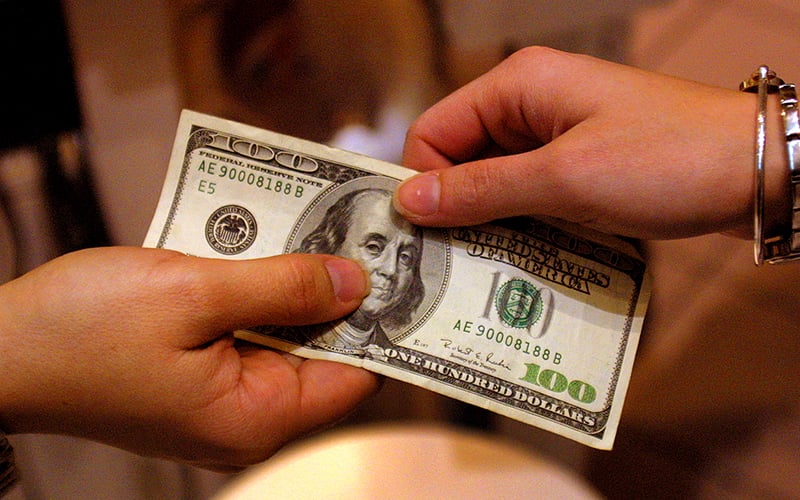
An upcoming Supreme Court decision could open the door for legalized sports gambling in Arizona. One senator would like to see revenue from betting go toward teachers’ salaries. (Photo by Joe Raedle/Newsmakers)
PHOENIX – At the end of a bar sits a man with a distinct 5 o’clock shadow. He is glued to a TV showing a meaningless NBA game featuring the Phoenix Suns and Charlotte Hornets.
It isn’t meaningless to him because he pawned his wedding ring and car to cover a bet on the Suns, who were 5½-point underdogs, hoping to recover from an enormous debt to his bookie. The team does not cover, however, and he awaits the goons and fears for his knee caps.
This is not real but the image many have about sports gambling.
“Gamblers are guys like me,” said Jason Logan, the managing editor of Covers.com.
Logan considers himself an average guy with a wife and kids, who likes to lay some money on games. He enjoys the excitement.
“It’s not a ‘in the shadows type’ thing, nor should it be,” Logan said. “It becomes legalized and you are going to get that overall experience. It’s not just something you do only in Las Vegas anymore.”
As gambling has grown in popularity, anticipation is high for a Supreme Court ruling that would pave the way for more legalized sports betting. Murphy v. NCAA addresses whether the U.S. government has the right to control state lawmaking, as New Jersey hopes to have a sports protection act overturned that would allow state-sponsored sports gambling.
A decision is expected by the end of June.
Many states are considering legislation that would legalize sporting betting as they await the ruling. Sen. Sonny Borrelli (R-Lake Havasu) said he would support legalized sports gambling and thinks some of that money could go toward teachers’ salaries, a hot button issue in the state.
“We’re sending all of our money to other states right now on sports betting,” he told AZFamily.com.
Gambling has become increasingly accepted but its dark history has contributed to its share of skeptics.
“I think people were worried about games possibly being altered,” said Johnny Avello, Executive Director of Racing Sports Operations at Wynn Las Vegas.
Point shaving scandals have been a part of sports history.
In 1994, two Arizona State basketball players, Stevin (Hedake) Smith and Isaac Burton, were found shaving points in multiple Pac-10 games during the season.
It was Las Vegas who alerted authorities when they noticed suspicious action during a March game against Washington.
In a Las Vegas Review Journal from September 2017, former Las Vegas Sports Consultants owner Kenny White noticed an abnormal amount of college students placing large amounts on a Saturday afternoon college basketball game.
In the same article, Sonny Vaccaro, who was then the Mirage Resorts’ Sports Director, said more than $525,000 was bet on the game, when normally a game like that would generate around $40,000 worth of action.
In 1997, The Arizona Republic cited an unidentified source who said a gambler, who was suspected of paying the ASU basketball players to shave points, placed more than $1 million worth of bets on that same game.
The Republic reported each bet was placed in less than $10,000 incriminates.
“We are the first to speak up when we think something is wrong,” Avello said.
Basketball has seen numerous accounts of point shaving, college and pro, most notably when former NBA referee Tim Donaghy pleaded guilty to allegations he fixed the spread for NBA games he officiated. Those games included Game 6 of the 2002 Western Conference Finals featuring the Los Angeles Lakers and Sacramento Kings.
Baseball is remembered for the Chicago Black Sox scandal when eight members of the team were accused of throwing the 1919 World Series against the Cincinnati Reds, and for Pete Rose, who later admitted to gambling on baseball while a manager and player for the Cincinnati Reds.
The Black Sox and Rose were banned from baseball, meaning they could no longer play or manage and are not allowed in Cooperstown.
These scandals were not associated with Vegas. They were done through illegal bookmakers, which made it hard for the league to track.
“I never thought it was dark because we (the Nevada Gaming Industry) have always been the actual watchdog over sports,” Avello said.
The sports world is years separated from a serious sports shaving scandal, which has caused that shadow of corruption to slowly move away.
Meanwhile, professional sports organizations are far more open to an association with Las Vegas than they have been in the past.
The NHL became the first major U.S. league to put a franchise in Las Vegas, where sports gambling is legal. The NFL will have a team there in 2019.
NBA Commissioner Adam Silver wrote in an opinion piece for the New York Times that it’s time to consider legalizing sports gambling. And Major League Baseball Commissioner Rob Manfred has suggested in the past that he sees a place for legalized betting in sports.
As a reaction to Murphy v. NCAA, the Players Associations for MLB and the NBA, NFL and NHL jointly issued a statement in April that they want players to have a voice if legal sports gambling becomes more widespread.
“Given the pending Supreme Court decision regarding the Professional and Amateur Sports Protection Act (PASPA) … The time has come to address not just who profits from sports gambling, but also the costs. Our unions have been discussing the potential impact of legalized gambling on players’ privacy and publicity rights, the integrity of our games and the volatility on our businesses.
“Betting on sports may become widely legal, but we cannot allow those who have lobbied the hardest for sports gambling to be the only ones controlling how it would be ushered into our businesses. The athletes must also have a seat at the table to ensure that players’ rights and the integrity of our games are protected.”